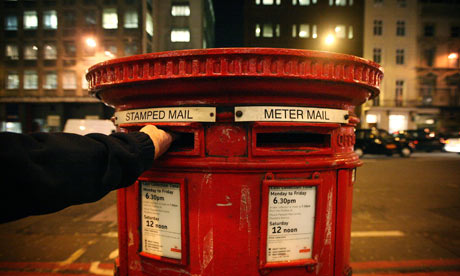
About a year ago, I wrote a blog about Cid Corman, and his peculiar habit of typing short poems on the outsides of the innumerable blue Japanese aerogrammes that kept him in touch with friends and fellow poets around the world. It was an unusual, if not unique, take on the genre of epistolatory poetry; however, there is nothing at all uncommon about the genre itself.
Poets have been writing letter-poems for a long time, at least since Horace produced his Epistles 2,000-odd years ago. He set the tone for much of what was to come by addressing his poem-letters to friends and by focusing mainly on satire, the need for reform in his own life, and the topic of writing itself. Unlikely as it may sound, by these standards the proto-Beat poet Jack Spicer comes very close to being Horatian in his letter addressed to Lorca.
The influence of Horace is also evident in the writings of the Augustan poets of the English 18th century, and any number of letter-poems could be cited from this period. The more I think about it, the more it seems to me that, of all these epistolatory poets, Pope reigns supreme. And among all his versified letters, few, if any, can compare with To a Lady On the Characters of Women, despite the frankly un-PC subject matter.
Of the English poets, Byron is perhaps the last you'd think of as a family man. However, his poem Epistle to Augusta, addressed to his sister, with its emphasis on the enduring primacy of sibling relationships ("the tie which bound the first endures the last") shows us an unexpectedly tender aspect of his complex personality.
Robert Browning is probably best known for his dramatic monologues, those poems in which he allows characters, some fictional, some historical, to reveal themselves through their speech. His Cleon is an interesting take on this basic idea, inasmuch as the eponymous figure is not speaking but addressing himself to another character, the tyrant Protus, his patron. The poem is a spirited defence of the importance of art against the claims of the politician.
Of course, I can hardly talk about letter-poems without touching on the love letter. Letters imply distance and separation; you are unlikely to write to someone you share a roof with. Maybe that's why so many love letters are actually end-of-love letters. And even the most ardent correspondent is likely to veer off into apparently inconsequential digressions inspired by their circumstances at the time of writing. One of my favourite love-letter-poems is Anne Sexton's Letter Written On a Ferry While Crossing Long Island Sound; Sexton manages to bring out the significance of the inconsequentialities, the way we try to hide our emotions behind them.
Equally terrific is Leonard Cohen's Famous Blue Raincoat, and again it is the balancing of the mundane and the significant that gives it its power. You might think that a man writing a letter to a friend who has stolen his lover's heart would be inclined to vent a little spleen, but what really gets across the depth of Cohen's feelings is the restraint of a phrase like "she sends her regards".
Sadly, the art of letter writing appears to be dying out. It seems all too probable that the epistolatory poem will be replaced by email verse or text-message poems. Call me old-fashioned, but I think it's a shame. Never mind – this week I'm calling on you to produce a last hurrah for the letter-poem. Remember, it's Freepost; no stamp is required.

